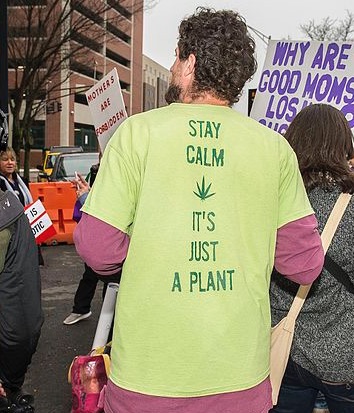The state of Vermont has kicked off an online marijuana education campaign aimed at curbing the state’s often-unreported high rate of cannabis use.

Despite the oft-repeated claims that marijuana — a Schedule I classified drug under the U.S. Controlled Substances Act — is safe, legalizing it has resulted in increased usage by minors, additional drug trafficking syndicates, and an increase in crime, including drugged driving.
The Department of Health’s new “Let’s Talk Cannabis” campaign comes after the Democrat- and Progressive-led Legislature has supported efforts that legalize recreational marijuana and other cannabis by-products.
Under Act 86, passed in 2018, it became legal for anyone 21 or older to possess small amounts of marijuana, up to an ounce. The law also allows a person to to cultivate two mature marijuana plants and four immature ones.
Despite being ranked as one of the healthiest states by the United Health Foundation, Vermonters are heavy users of intoxicating, THC-laden marijuana.
According to the Vermont Department of Health’s website, the number of Vermonters who try marijuana for the first time — typically between the ages of 12 and 17 — is the highest in the nation.
Vermont Health Commissioner Mark Levine is now on the stump promoting the agency’s “Let’s Talk Cannabis” campaign. Levine was appointed commissioner by Gov, Phil Scott in 2017.
The new effort is primarily a web resource of what Levine has termed “science-based information,” and it is aimed at increasing awareness about cannabis and how it affects the body, brain and overall health.
According to Levine, “Let’s Talk Cannabis” offers facts, tips and other resources for youth, young adults, breastfeeding mothers, parents and health-care professionals.

Dr. Mark Levine: “As with all substance use, consumption of cannabis can be unhealthy.”
“With changes in the legal landscape surrounding possession and use, it’s important that people understand how it can affect their health,” Levine said regarding the program. “As with all substance use, consumption of cannabis can be unhealthy. ‘Let’s Talk Cannabis’ gives Vermonters the information they need to make safe and informed choices.”
Levine is especially concerned about health problems linked to cannabis use, such as for women who breastfeed or who are pregnant.
“Cannabis use can harm your baby,” Levine said. “If you’re pregnant or are planning to be, or you breastfeed your infant, it’s very important that you not use cannabis in any form.”
But is the state’s education campaign effort too little, too late?
A Vermont-licensed pharmacist has already sounded the alarm about the increasing use of various cannabis-derived products, such as CBD (cannabidiol), by Vermonters in both the home and on the farm.
In addition to over-the-counter sales of CBD products in Vermont drug stores and even hardware stores, Judith Margulies, a registered pharmacist in Vermont and Massachusetts, told True North in September that significant amounts of fat-soluble cannabinoids are likely to be introduced to Vermont-branded meat and milk under the state’s relaxed new laws relating to the cannabis or hemp plant.
RELATED: Pharmacist warns about cannabis-derived CBD entering Vermont’s food chain
Margulies sees danger in various over-the-counter CBD “cure all” products (including smokable CBD “hempettes” containing small amounts of THC) now available around Vermont. She warns that these products have untested long-term effects on the human body.

Pharmacist Judith Margulies says state officials’ relaxed attitude about cannabis-derived products in Vermont is troubling.
While legal CBD is considered to be a non-intoxicating, non-psychoactive drug, unlike the cannabis plant’s THC, it still effects the brain, she said.
Margulies said “it is believed use of CBD may increase genetic abnormalities, decrease the ability of red blood cells to carry iron, decrease peripheral nerves, and increase intraocular pressure leading to blindness.”
And while it is illegal in Vermont for anyone under the age of 21 to consume or possess cannabis with a THC content above 0.01 percent, national data shows that more young Vermonters age 12 and up are using marijuana compared to the U.S. overall.
At the time the 2017 Vermont Youth Risk Behavior Survey was conducted, 24 percent of high school students reported marijuana use within the prior month.
“Marijuana use changes teens’ brains, bodies and behaviors,” Levine said. “’Let’s Talk Cannabis’ is designed to provide relatable information to young Vermonters so they can understand how the drug influences their bodies and thinking.”
The agency noted that “Let’s Talk Cannabis” is a companion to other widely available resources, including ParentUpVT.org, which provides parents and teachers with information and tips about substance use and misuse, including cannabis.
Lou Varricchio is a freelance reporter for True North Reports. Send him news tips at lvinvt@gmx.com.



Apparently, too many in the legislature who support the legalization of marijuana subscribe to the tried and true, “don’t barher me with facts, my mind’s made up” approach to this subject. How about Dr. Lavine’s comments and those of Ms. Margulies for example?
Just an attempt by the governor to give an appearance that he is doing something about the problems he’s created. He doesn’t really want to fix the problems. That might cut into the profits of his friends in the marijuana business.
So you’re going to put the kids to sleep with boring lectures? How about some real stories of people who died as a result of their marijuana use?
Straight from the coach’s Prohibitionist playbook.
Just how inept is Montpelier, they pass act 86 and they didn’t think that things
like ” higher ” usage wouldn’t happen……..
I know they didn’t listen to anyone that had concerns and stated about the ramifications
that would follow, all they could see was revenue, revenue……… Idiots!!
The old adage ” you’ve made your bed, now lie in it “……… There you go Montpelier !!